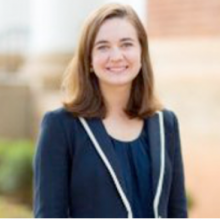
Emily (Snow) Miller
At the time of the interviw, Emily worked as a Consultant for BCG. Now, Emily works as a Project Leader for BCG.
1. Why did you choose to study economics?
A month into my first semester, Professor Elzinga gave a lecture in ECON 201 that changed the course of my college trajectory. The topic—rational consumer behavior—was neither inspiring nor profound, but the lesson stuck. I found myself measuring the costs of a good in terms of its next best alternative, ignoring sunk costs when I made a decision, and seeing applications of economics everywhere. Drawn to this “economic way of thinking” during my first months of school, I attended my professors’ office hours, participated in behavioral experiments in the VEcon Lab, and even went water-skiing with Professor Elzinga. As I pursued economics further in subsequent semesters, I was struck by its systematic explanations for the world around me—everything from business strategies to Congressional voting procedures to income inequality. I was fascinated by these questions and the way that economics answered them, and there was no turning back!
2. What courses/ professors have been particularly influential and why?
This question is a tough one, because there have been so many! I'm grateful to Mr. Elzinga for his wise counsel, steadfast mentorship, and the way that he constantly challenges me. His ECON 201 class first drew me to the subject, and since then I've had the pleasure of learning from him in his Antitrust seminar and through an independent study on the intersection of economic thought and Christian theology. I'm grateful to Mr. Coppock for his encouragement and natural gift for relating to students. His Public Choice seminar was incredibly interesting and stimulating, and it remains by favorite class to date. I'm grateful to Mr. Holt for his patience, kindness, and willingness to invest in my academic potential. Learning from his expertise in experimental economics has been a true privilege. And the list goes on! I'm grateful to Mr. Olsen for guiding me through my first research project, to Mr. Burton for connecting me wonderful people and opportunities in the Department, to Ms. Turner for her amazing dedication to her students' flourishing, and to many others who have invested in me.
3. What makes the economics department special?
As my previous answer demonstrates, the faculty in the economics department have made all the difference to me. They create an atmosphere in which freedom of inquiry flourishes and opportunities abound. During my time in the department, I've particularly enjoyed the opportunity to conduct research. Last year, I completed an independent study in which I used Stata to estimate the efficiency gains of housing vouchers as opposed to public housing. Additionally, I work as a Research Assistant in the VEcon Lab, exploring ways that human behavior either aligns with or deviates from economic theory. In addition to these pursuits, I've also gained immense value from the opportunity to serve as a Teaching Assistant in introductory economics courses. Teaching is a great responsibility and privilege, and helping my students grasp the discipline’s most fundamental principles reminds me of why I fell in love with economics in the first place.
4. How did you spend your summer between third and fourth year? (This language has been changed. Former question asked “How did you spend last summer?” Or, we may mention in the heading that these responses were collected while you were a student and now you are an Associate with BCG.)
I had a fantastic summer interning for BCG in their DC office. My role as a Summer Associate involved collaborating with my case team to strategically simplify the organizational structure of a large tech firm. Day to day, I spent good deal of my time building models on Excel, creating Powerpoint decks for client presentations, and performing data analysis with my team. At the most basic level, my task was to solve problems, and both the content of the work and the atmosphere of the office made my job both stimulating and sustainable. I have no doubt that the experiences the Economics Department has provided me differentiated me as a job candidate, and Jen Jones and the ECO office were enormously valuable to me as I navigated the job recruitment process. Furthermore, once I began my internship, it became abundantly clear that the critical thinking that I learn through my economics coursework would help me succeed in the Associate role. I am looking forward to returning to BCG as a full-time Associate next year.
5. What is the most interesting thing you've done in the Department?
Serving as one of the first undergraduate Teaching Assistant for introductory economics courses has been and continues to be an incredible privilege and learning opportunity. Standing in front of a classroom twice each week, I’ve learned to present economics concepts in creative ways. I’ve learned to establish credibility by coming prepared for class and by speaking with confidence. I’ve learned to establish approachability by adding lighthearted elements to my lessons and being transparent about any mistakes I make. Working one-on-one with my students, I’ve learned the joys of helping others succeed. I’ve learned to help my students work out practice problems themselves, rather than just listen to me explain them. I’ve learned to exhibit patience and encouragement in the face of my students’ frustration and disappointment, particularly after midterms.
As a returning TA this year, my goal is been to use these lessons to both improve upon my teaching and to be a leader among new undergraduate TAs. I seek to be a role model by putting my students’ needs above my own. Whether it means putting extra effort into planning interactive lessons, sacrificing time to meet outside of my office hours, or simply demonstrating to my students how much I care about their success, my role as a Teaching Assistant continues to be my most meaningful University involvement.
